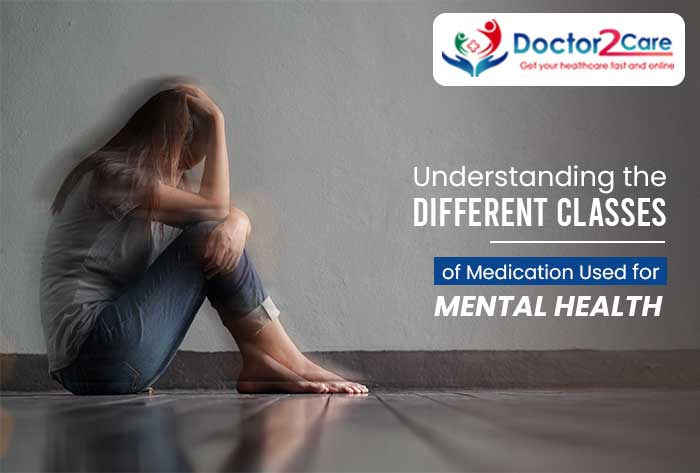Understanding the Different Classes of Medication Used for Mental Health

In the realm of mental health treatment, medication plays a pivotal role in alleviating symptoms and restoring balance. Various classes of medications are available to address different mental health disorders.
This blog delves into the diverse classes of medication commonly prescribed for mental health conditions. Understanding these classes can provide insights into the treatment options available for individuals seeking mental wellness. Also, it is highly important to consult with a doctor and you can do that through online doctor consultation in India.
Here is a list of diverse classification of medication for common mental health issues.
Antidepressants: Alleviating the Burden of Depression and Anxiety
One of the most prevalent classes of medications used for mental health is antidepressants. These medications are primarily prescribed for depression but can also be effective in managing anxiety disorders, obsessive-compulsive disorder (OCD), and other related conditions.
Antipsychotics: Restoring Clarity in Psychosis
Individuals with conditions such as schizophrenia and bipolar disorder may benefit from antipsychotic medications. Antipsychotics are designed to manage symptoms of psychosis, including hallucinations, delusions, and disorganised thinking. There are two main types of antipsychotics: typical and atypical. While typical antipsychotics primarily block dopamine receptors, atypical antipsychotics target multiple neurotransmitter receptors, resulting in reduced side effects and improved efficacy.
Anxiolytics: Easing Anxiety and Restoring Calm
Anxiety disorders can significantly impact one's quality of life, but anxiolytic medications offer relief from excessive worry and fear. Benzodiazepines, a commonly prescribed class of anxiolytics, act on the central nervous system, enhancing the calming effects of the neurotransmitter GABA. However, due to their potential for dependence and sedation, they are often prescribed for short-term use. Other anxiolytic options include selective serotonin reuptake inhibitors (SSRIs) and buspirone, which provide longer-term relief by regulating serotonin levels and modulating anxiety-related brain activity.
Mood Stabilizers: Balancing Emotions in Bipolar Disorder
Bipolar disorder is characterised by extreme mood swings, ranging from manic episodes to depressive lows. Mood stabilisers are the cornerstone of treatment for this condition. Lithium, a commonly used mood stabiliser, helps regulate mood by modifying neurotransmitter activity. Other options, such as valproic acid and lamotrigine, are also effective in stabilising mood and reducing the frequency and intensity of mood episodes.
Stimulants: Enhancing Focus and Attention in ADHD
Attention deficit hyperactivity disorder (ADHD) often affects individuals' ability to concentrate and control impulsive behaviour. Stimulant medications, such as methylphenidate and amphetamine-based drugs, are commonly prescribed to improve focus and attention. By increasing the availability of certain neurotransmitters in the brain, these medications help regulate impulse control and cognitive functioning. When used as part of a comprehensive treatment plan that may include therapy and lifestyle modifications, stimulants can significantly enhance the quality of life for individuals with ADHD.
Sedatives/ Hypnotics
These medications are used to promote sleep and manage sleep disorders such as insomnia. They may include benzodiazepines, non-benzodiazepine hypnotics, or sedating antidepressants.

Wrapping Up
The diverse classes of medication used for mental health provide valuable options for individuals seeking relief from the burdens of depression, anxiety, psychosis, bipolar disorder, and ADHD. Checking with healthcare professionals before starting the medications is crucial to determining the most suitable medicines.